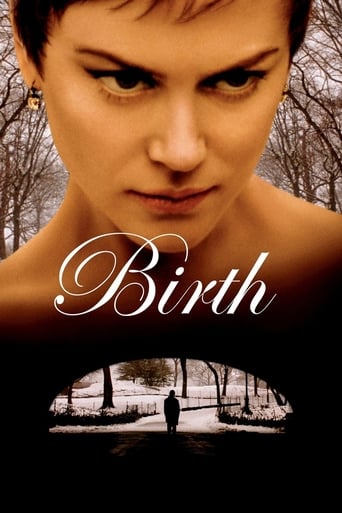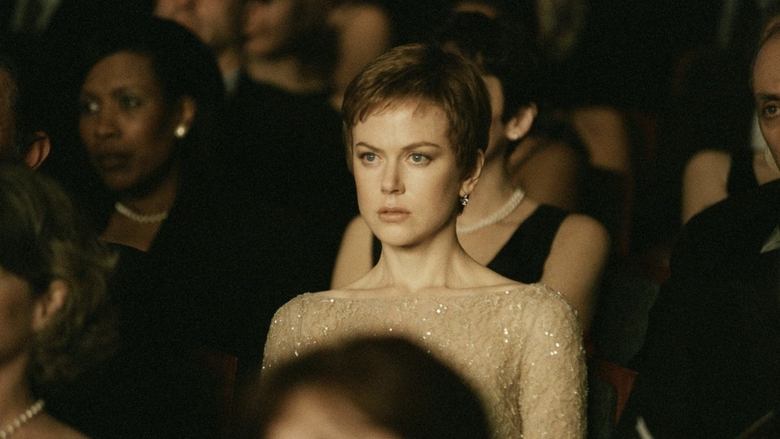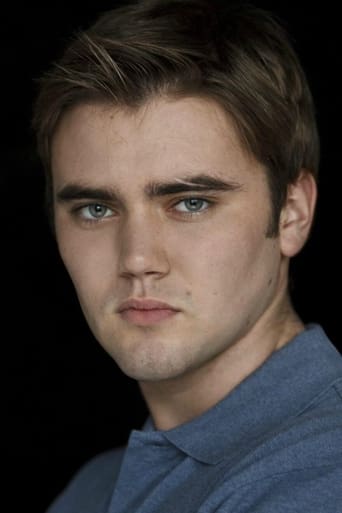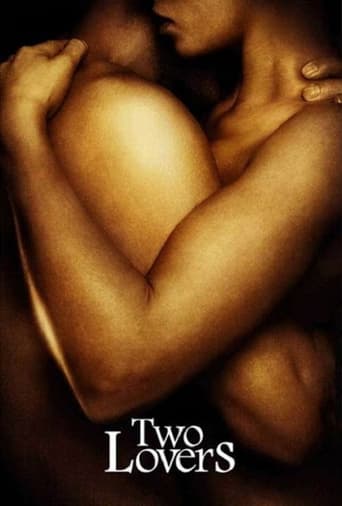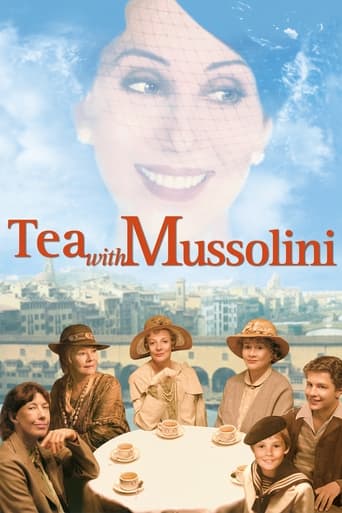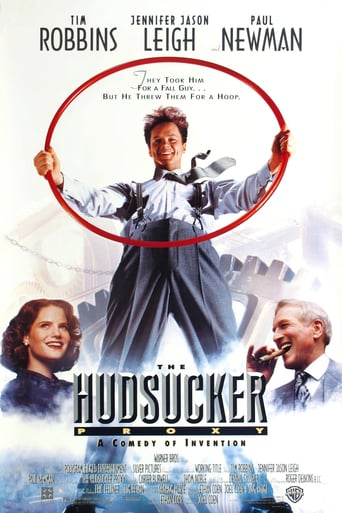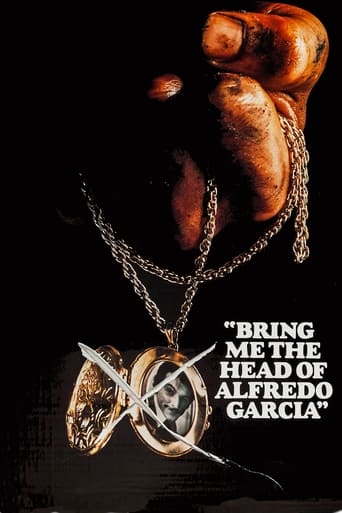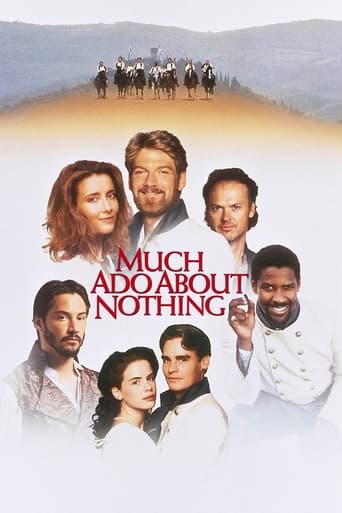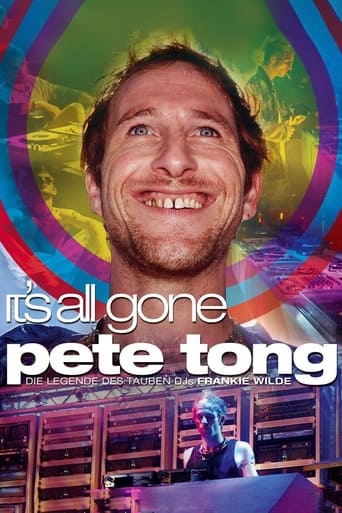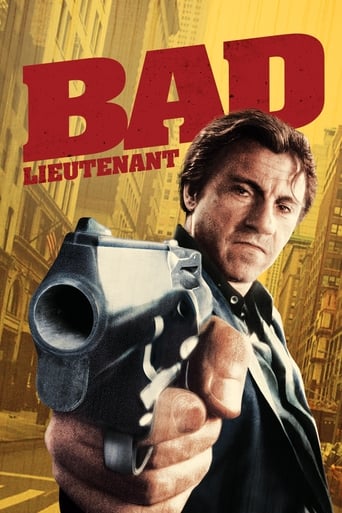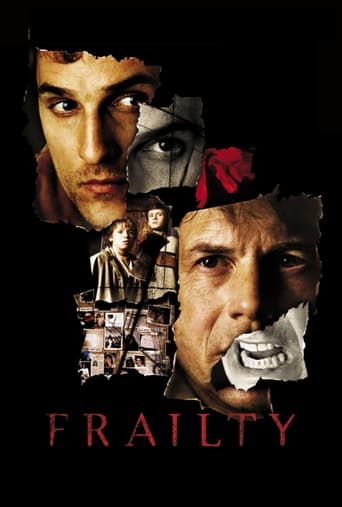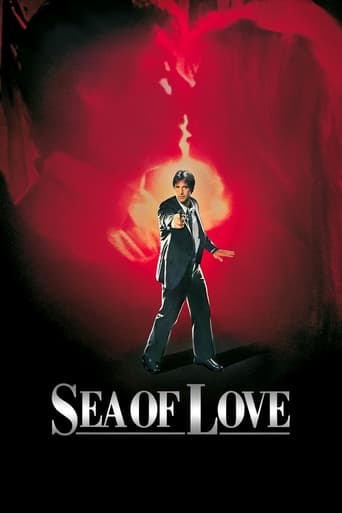Birth (2004)
It took Anna 10 years to recover from the death of her husband, Sean, but now she's on the verge of marrying her boyfriend, Joseph, and finally moving on. However, on the night of her engagement party, a young boy named Sean turns up, saying he is her dead husband reincarnated. At first she ignores the child, but his knowledge of her former husband's life is uncanny, leading her to believe that he might be telling the truth.
Watch Trailer
Cast


Similar titles
Reviews
Instant Favorite.
The storyline feels a little thin and moth-eaten in parts but this sequel is plenty of fun.
Like the great film, it's made with a great deal of visible affection both in front of and behind the camera.
It is encouraging that the film ends so strongly.Otherwise, it wouldn't have been a particularly memorable film
Now Birth is an interesting picture. After watching Dogville and To Die For (And of course Eyes Wide Shut being my favorite movie), I have been very interested in seeing Kidman pictures. She has a way about her that calls for attention, and yet you are well aware of the others in the room. It's almost annoying, but it does the job, and it does it very well.This story is about Nicole Kidman's character discovering her dead husband may be a little boy resurrected. What got me from the beginning was her new husband, who mentions at the beginning that he had to chase her to get her to marry him. He kept calling and asking for date, and eventually it just clicked. And at the very end, the same theme applies on their wedding date: She is more hesitant, and he is pulling her close.That is the main emotion I received from the story, and everything in between was very captivating, but holds nothing in the aftermath. Once you learn the child has made the whole story up, the whole premise becomes pointless except for the fact mentioned in the previous statement.6 STARS! May deserve less
The 'controversy' around this film did not faze me at all. The reason I am submitting such a low score is because I feel this film was just cruel, artlessly cruel, to all of it's characters. I've seen tragedies, sad films, that I've enjoyed or at least not completely disliked because I saw they were trying to do something with it, but I honestly came away from this film with the impression that everyone in the film suffered and that NOTHING was learned. I didn't take anything away from it. It doesn't tell you anything about humanity that you don't already know. I've seen dark and depressing films before that moved me, but all this film did was make me want to find who made it, punch them in the face and ask "WHY!? WHY DO YOU HATE PEOPLE SO MUCH!?"
I've been hearing for a while now about the praise Nicole Kidman receives in Birth, and so I definitely saw it for her. She was magnificent, one of her very best performances and perhaps her best performance of the 2000s. However, I also found the film to be quiet effective. It has an ominous, wonderfully atmospheric tone and sensitive direction that sort of manages to cast a spell on you (the way Kidman's character perhaps is in the film). I do wish it was left more ambiguous, and there's still quite a few things that don't entirely make sense when you think about the "ending resolution". Still, surprised it got such a cold response from critics.
"Sorrow makes us all children again." - Ralph Emerson Jonathan Glazer's "Birth" stars Nicole Kidman as Anna, a woman whose husband died ten years earlier. Though still mourning her husband's passing, Anna begins a relationship with Joseph, whom she somewhat reluctantly plans to marry. Things get complicated, however, when a ten year old boy enters Anna's life. She doesn't know him, but the boy claims to be her long dead husband. Much creepiness, confusion and mystery then ensues."Birth" was written by Jean-Claude Carriere, who worked on a number of Luis Bunuel's scripts ("Belle de Jour", "The Milky Way", "The Discreet Charm of the Bourgeoisie", "The Phantom of Liberty", "That Obscure Object of Desire"). Like most of those films, "Birth" eventually becomes a meditative inquiry, the ten year old boy becoming a manifestation of Anna's grief and pre-marital anxieties. He is a weight tying her to the past, an anchor preventing her from moving on. In a very real sense, his birth prevents her rebirth.It's important to remember that Carriere often writes about issues of theology and has even interviewed the Dalai Lama several times. So look closer, and "Birth" is very much about faith, belief and even fundamentalism. In this regard, the film revolves around twin beliefs; Anna's absurd belief that the boy is her husband reborn, and the boy's belief that he can be her husband if only he ritualistically love her like a husband should. For obvious reasons, both beliefs are presented as being, not only irrational, but highly transgressive, veering into paedophilia in Anna's case and peripubescent teleiophilia in the boy's case. But both transgressions are also shown to be surmountable, the film echoing Blaise Pascal's famous advice to those who struggle with faith: when in doubt, ritualistically kneel down and pray until faith comes to you. This, of course, echoes numerous self-help mantras: "Believe until you believe", "Fake it until you make it", "Practise makes perfect" etc. What the film says, though, is that, not only is belief less dependent on the subject's critical judgement than on habit, but that belief always serves to delay the inevitable. Belief always delays realisation and defers (unattainable) satisfactions and expectations. Belief, then, is the postponement of the trauma of belief. In this regard, Anna not only feigns love in order to postpone the realisation that the boy is not her husband, but feigns love in order to delay having to feign love for a new man, the Biblically named Joseph. The film then ends with Anna on a beach, tearfully embracing her new husband. She will fake it with him until she believes it. The difference is, now she's learnt she never will. This is Antonioni/Kubrick territory ("Beyond The Clouds", "Identification of a Woman", "Eyes Wide Shut" etc): our only means of being guilty is by giving way to desire, and the only way that one can truly love another is by absolving them of the burden of believing in that love.For three quarters of its running time, "Birth" is a masterful picture. This is a type of high-brow "European psychodrama" which all but died in the 1960s. Elsewhere it resembles the moody horrors of early Polanski ("Repulsion", "The Tenant" and "Rosemary's Baby", Kidman even sporting a Mia Farrow haircut) and late Kubrick (The Shining", "Eyes Wide Shut"), with a little Hitchcock thrown in. Shot by cinematographer Harry Savides (the sublime "Elephant"), it's a gorgeous film, filled with elegant passages, enchanting moments, and spooky, stealthy camera movements.Unfortunately the film's final act is a mess, "Birth" degenerating into merely a classier version of "The Sixth Sense", topped off by a generic "beach ending" reminiscent of Truffaut's "400 Blows" and Fellini's "La Dolce Vtia". And so by the film's climax, the audience is offered one of two readings. Either there genuinely was a reincarnation, the boy halting his romantic pursuits simply because he realised that he was unfaithful to his wife in his prior life, or there was no reincarnation, the boy concocting an elaborate plot because of his infatuation with Anna. The latter reading is the more interesting, as it suggests that the boy's fantasies stem from his poverty. This again is a common Jean-Claude Carriere theme; the pauper child wants to live in Anna's world of wealth and elegance, but cannot have it because he refuses to be the bastard her husband was.Watch the film a second time, though, and neither reading enhances the film or adds nuance to what we see unfold. Instead, our newfound knowledge seems to push "Birth" toward the phony and the unsatisfying. In a way, this is thematically fitting. The con job the kid plays on Anna is akin to the con job this film plays on its audience. It's all outer appearances and outer beauty, all of which masks the fact that there's nothing present except for the longing of presence.8/10 – See Agnieszka Holland's similarly themed "Olivier, Olivier". Worth two viewing.

